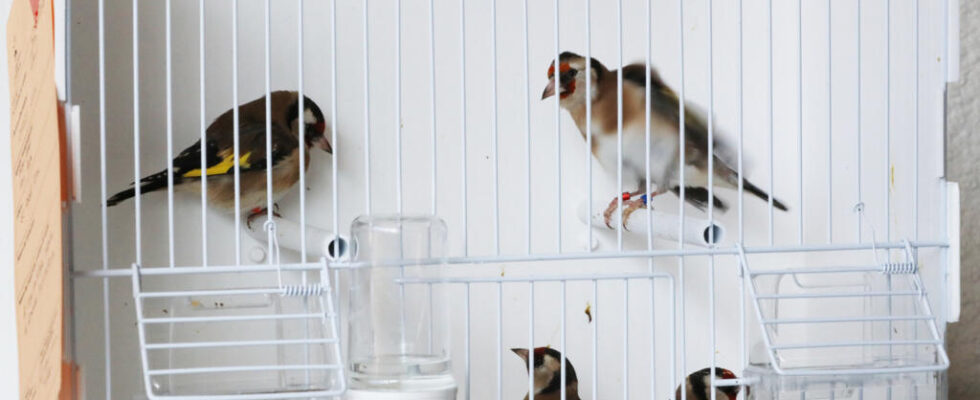In France, more than 600 species of birds are threatened. Among them, elegant goldfinches and passerines, the main victims of trafficking for their melodious song, their plumage or even their meat.
4 mins
From our correspondent in Marseille,
At the Marseille flea market, strange birds are hidden under tables and in back rooms. With their red heads and yellow, black and white plumage, make no mistake, these are elegant goldfinches. In the specialist shops, at the very back of the market, all you have to do is ask the question: ” Do you sell goldfinches? “The salesman looks you over a bit, he insists on exchanging a few words. But he ends up taking the six birds out of the back room one by one.” How much does this one cost? »
The price varies from one bird to another: €80 for the smallest, €150 for the one presented as the rarest. A rarity attributed to the plumage, but especially to the beauty of the bird’s song. And if the transaction seems to be foolproof, it is totally illegal.
“ Goldfinch capture is the main problem in Marseille “, explains Anaël Marchas, legal mediator within the League for the protection of birds in the Provence-Alpes-Côte-d’Azur (Paca) region. With a resale price that can go up to €700, or even €1,000 in some cases, these singers are victims of their success every winter and during the nesting period. They are caught in wasteland areas or even parks. The vegetation is cut beforehand to encourage the birds to land, he continues. In addition to injuring them, it is a non-selective method of capture. I have already found birds that were not goldfinches, thrown to the ground, their wings “glued” in the back. »
Birds sold at the flea market, but also on a very popular online sales site: “ Unfortunately, we do not have the means to monitor the platform.admits Anaël Marchas. The priority is to act at the source: to arrest the trafficker. To do this, we forward the reports we receive to the French Office for Biodiversity. They are the ones who will conduct the investigation and who will be able to arrest the poachers. »
The other traffic: the Rigaou skewer
Some people prefer their meat to the song of birds. This is the second most common reason for poaching protected species: the illegal hunting of passerines for culinary purposes. Robins, sparrows, tits, warblers, finches sold on skewers of six, ready to eat. Expect to pay €30 to €40 for a ” Rigaou skewer “.
Captured in fields, private gardens or imported from the Maghreb, they are resold on markets or in amateur networks. We put these little spring traps in the vegetation, an insect on a stem that will serve as a trigger. When the robin, since it is the one we are targeting as a priority, wants to catch the insect, the trap will close on it. “, explains Anaël Marchas of the LPO.
As with the goldfinch, the capture method is non-selective. Choice delicacies, prized at the end-of-year festivities and whose poaching is sometimes organized into real networks, estimates Anaël Marchas: ” We have already found freezers full of them. There were hundreds of birds. They belonged to poachers who had ten lines of ten traps… And therefore a hundred traps in operation. » Traps checked mornings and evenings, from November to February. For thousands of protected birds poached each year.
And justice?
June 2024, at the Marseille Judicial Court, two poachers are tried for possession and trafficking of protected species. They were arrested in the act a few months earlier in the 11th arrondissement of the Phocaean city. On them, two remotely activated nets to catch birds, four cages, gardening equipment and four goldfinches. A hell of a haul completed by the seizures at the poachers’ homes where several hundred euros in cash and three birds are found.
In court, the main accused, 26, immediately confessed: ” I didn’t know they were protected birds. I won’t do it again. I love birds. “On the civil party side, it is hard to believe: “ When you love birds, you don’t leave them in such a dirty state. Of the seven goldfinches rescued and taken care of by the LPO, five died. “, explains Master Mathieu Victoria.
On the civil parties’ bench, alongside the LPO, Maître Isabelle Vergnoux, from the Association for the Protection of Wild Animals, who confided her fears of repeat offences to the bar: ” We are dealing with a very lucrative traffic, more so than drugs. But with much less severe penalties. I hope that this hearing will raise awareness, because these are the poachers who are decimating a species solely for profit. »
According to Article L415-3 of the Environmental Code, these traffickings are punishable by maximum penalties of three years in prison and a fine of 150,000 euros. In reality, the penalties are often minimal. In this trial, the defendants were sentenced to six and four months in prison, suspended, and a fine of 500 euros, respectively.
